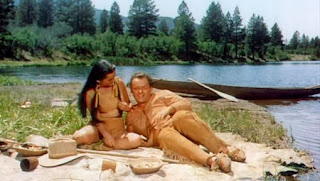Director: Samuel Fuller
Rod Steiger, Sara Montiel (AKA Sarita Montiel), Brian Keith, Ralph Meeker, Jay C. Flippen

Run of the Arrow (Samuel Fuller, 1957) is an embryonic version of Dances With Wolves in director Sam Fuller's familiar tabloid style: short, flamboyantly written and with the best stuff right at the top. It begins on Palm Sunday, 1865, "the last day of the war between the states", with Fuller taking us to the very heart of the conflict via a mesmerising opening tracking shot. Corpses are strewn across the smoking landscape, where an unmanned cannon has fallen silent, smashed to pieces. An air of desperation and exhaustion hangs heavy over the action. A Yankee soldier on a knackered horse staggers towards some unknown, meaningless destination. A shot rings out and he slumps to the ground. A Confederate infantryman (Rod Steiger) lowers his gun and moves forward. Ransacking the man's pockets, he finds a food parcel and begins eating the spoils off the dying man's stomach. That line from The Night They Drove Old Dixie Down comes to mind: "We were hungry, just barely alive." Having had his fill, Steiger straps the man to the guy's own horse, and takes him to a field hospital. It's a brilliant intro. But then Steiger starts talking and the film goes downhill.
Accents are a funny thing. It's nice when someone gets a voice down pat, but it often feels like window-dressing. And illogical window-dressing at that, since Nazis don't generally converse with one another in heavily-accented English. Jimmy Stewart gave a great performance in The Shop Around the Corner without attempting a Hungarian accent, and Claude Rains was a fitting French captain in Casablanca despite his distinctive English tones. Keeping your own accent also means you avoid taking a road to supposed 'authenticity' that's full of pitfalls. A terrible voice can sink a film, or at least prove a major distraction, and that's the case here. Playing a second-generation Irish immigrant fighting for the Confederacy, who finds a new home with the Sioux, Steiger opts for an accent that can best be described as 'South Asian Norwegian'. Perhaps he was confused about playing an honorary Indian, because no matter how bold and progressive the film is, offering an insightful look at Sioux customs, it still has a hero who sounds like a sort of Slumdog John Qualen. By d'yevil.
Such self-satisfied broadsides aside (I'm sorry, I really do like Fuller), Run of the Arrow turns out alright. The titular rite-of-passage - which sees Steiger forced to outpace some rampaging Sioux, or else find a new skin - is exciting and well-paced, with an intelligent follow-up in the second half. Fuller's much-celebrated focus on the feet during that sequence was actually enforced by Steiger's sore ankle, but elsewhere there's some strong direction that makes the most of several ambitious, realistic sets. Steiger is periodically effective, even hampered by that ridiculous voice, with Ralph Meeker perfectly cast as his main nemesis - a cigar-chomping Indian-hater - and Brian Keith an effective moral yardstick, though the rest of the cast is largely nondescript. The interesting, well-researched portrait of the Native American lifestyle is ultimately overtaken by a drawn-out action climax that begins effectively, with an interesting subversion of Western folklore that sees the Indians riding to the rescue, but frankly goes on a bit. Fuller's script also lacks clarity, even when dealing with his favourite theme of redemption, which is very unusual for this filmmaker.
In the end, Run of the Arrow is a fascinating, admirably ambitious film, but it's a long way from being a classic, with confused plotting and an inability to build on its fascinating opening scenes. On this evidence, it's a damn shame that Fuller never made a full Civil War picture, as he seems ideally suited to the material. But then again, every Fuller film starts and ends with a bang, and though John Ford's 21-minute section of How the West Was Won ('The Civil War') is extraordinary, his feature-length treatment of the conflict he remained so obsessed with, The Horse Soldiers, is a shambles.






.jpg)
.jpg)
.jpg)
.jpg)
.jpg)
.jpg)
.jpg)
.jpg)
.jpg)
.jpg)
.jpg)



15-08-57%5D.jpg)












.jpg)



No comments:
Post a Comment